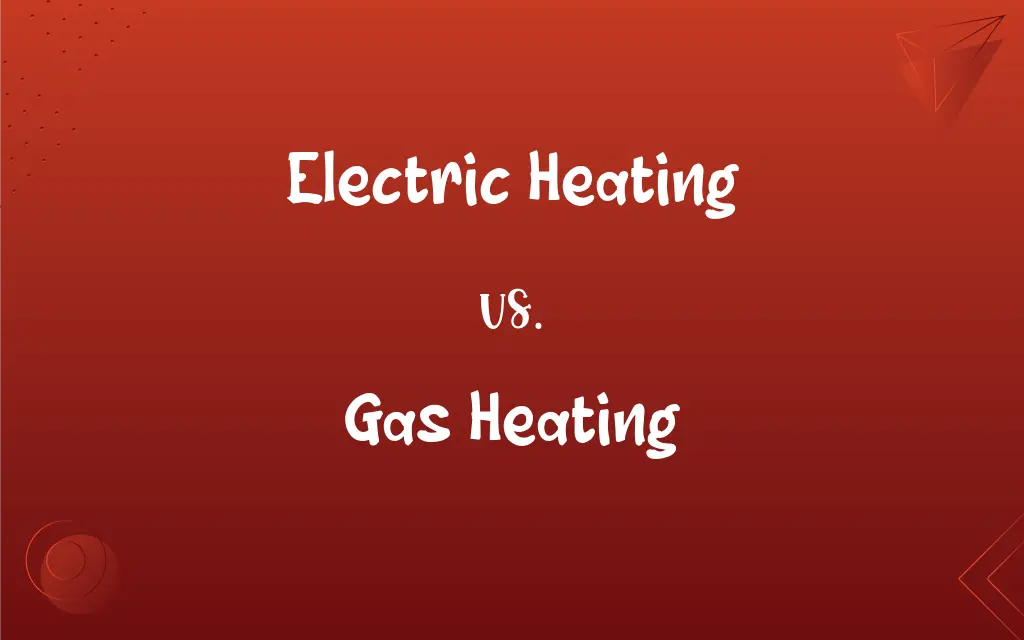Electric Heating vs. Gas Heating: What's the Difference?
Edited by Aimie Carlson || By Janet White || Published on December 30, 2024
Electric heating converts electrical energy to heat, while gas heating burns natural gas or propane.

Key Differences
Electric heating involves converting electricity into heat energy through devices like electric radiators, heat pumps, or underfloor heating systems. It is considered clean at the point of use, meaning it does not produce emissions where it is utilized. Gas heating, on the other hand, involves burning natural gas or propane to produce heat. This process is often more cost-effective than electric heating due to the lower cost of gas compared to electricity.
Electric heating systems are praised for their efficiency and potential for using renewable energy, they may come with higher operational costs in regions where electricity is expensive. Gas heating systems, despite their efficiency and lower operational costs, pose challenges such as the risk of carbon monoxide poisoning if not properly maintained and the environmental impact of fossil fuel consumption.
The choice between electric and gas heating often comes down to the availability of supplies, initial setup and maintenance costs, and environmental considerations. Electric heating offers a potentially cleaner alternative, especially if sourced from renewable energy, while gas heating remains a popular choice for its cost-effectiveness and rapid heating capabilities.
Comparison Chart
Energy Source
Uses electricity
Uses natural gas or propane
Installation Cost
Generally lower, no need for gas pipelines
Higher, requires gas supply and venting
ADVERTISEMENT
Operational Cost
Higher, depends on electricity rates
Lower, gas is usually cheaper than electricity
Environmental Impact
Lower if electricity is from renewables
Higher, due to CO2 emissions from burning gas
Heating Efficiency
High, converts most electricity to heat
High, but some energy lost in combustion
Maintenance Requirements
Lower, fewer moving parts
Higher, needs regular checks for safety
Electric Heating and Gas Heating Definitions
Electric Heating
Electric heating can be powered by renewable energy sources, making it an eco-friendly option.
The solar panels on our roof power our home’s electric heating, reducing our carbon footprint.
ADVERTISEMENT
Gas Heating
Gas heating involves burning natural gas to produce thermal energy.
Our gas furnace heats the entire house efficiently during winter.
Electric Heating
Electric heating systems utilize resistive or radiant technology to provide warmth.
The electric underfloor heating provided a cozy feeling throughout the house.
Gas Heating
Gas heating requires a connection to a natural gas supply line or propane tank.
After connecting our home to the natural gas line, we installed a gas heating system.
Electric Heating
Electric heating offers versatile installation options, from baseboard heaters to heat pumps.
Installing a new electric heat pump significantly improved the energy efficiency of our home.
Gas Heating
Gas heating systems are known for their rapid warmth and cost-effectiveness.
The new gas boiler provided immediate warmth and reduced our heating bills.
Electric Heating
Electric heating is the process of converting electric energy into heat.
Turning on the electric heater quickly warmed the room.
Gas Heating
Gas heating systems often require venting to safely remove combustion byproducts.
Installing proper venting for our gas heater was crucial for our family’s safety.
Electric Heating
Electric heating is an efficient method for climate control in residential and commercial settings.
Electric heating systems are essential for maintaining comfort in modern office buildings.
Gas Heating
Gas heating can be used in central heating systems, including furnaces and boilers.
The central gas heating system ensures that every room in our house is comfortably warm.
FAQs
What is gas heating?
Gas heating burns natural gas or propane to generate heat in systems like furnaces.
How does electric heating work?
Electric heating uses resistance or heat pump technology to convert electricity into heat.
How does gas heating work?
Gas heating involves combusting gas to produce heat, which is then distributed.
What is electric heating?
Electric heating converts electrical energy into heat through devices like radiators or heat pumps.
What are the benefits of gas heating?
Gas heating is cost-effective, provides quick warmth, and is efficient for large spaces.
Is electric heating more expensive than gas heating?
Yes, electric heating can be more expensive due to higher electricity rates compared to gas.
How long do gas heating systems last?
Gas heating systems typically last 15-20 years with proper maintenance.
What are the benefits of electric heating?
Benefits include no emissions at the point of use, high efficiency, and easy installation.
What maintenance does gas heating require?
Gas heating systems require regular checks for leaks, venting, and overall operation.
Are there eco-friendly options for electric heating?
Yes, using electricity from renewable sources makes electric heating eco-friendly.
Can I install electric heating in an apartment?
Yes, electric heating options like underfloor heating or radiators are suitable for apartments.
What's better for the environment, electric or gas heating?
Electric heating, especially if powered by renewable energy, is generally better for the environment.
Are there any government incentives for installing efficient heating systems?
Yes, many governments offer incentives for installing energy-efficient heating systems, both electric and gas.
Can electric heating be powered by renewable energy?
Yes, electric heating can utilize renewable energy sources like solar or wind power.
Is electric heating safe?
Electric heating is considered very safe, with no risk of gas leaks or carbon monoxide.
How long do electric heating systems last?
Electric heating systems can last 20-30 years with minimal maintenance.
Do electric heating systems require a lot of maintenance?
No, electric heating systems generally require less maintenance than gas systems.
Is gas heating available everywhere?
Gas heating requires access to a natural gas supply or propane, which may not be available everywhere.
Can gas heating affect indoor air quality?
Yes, improper venting can lead to indoor air pollution.
Can I switch from gas heating to electric heating?
Yes, but it may involve significant upfront costs for installation and equipment.
About Author
Written by
Janet WhiteJanet White has been an esteemed writer and blogger for Difference Wiki. Holding a Master's degree in Science and Medical Journalism from the prestigious Boston University, she has consistently demonstrated her expertise and passion for her field. When she's not immersed in her work, Janet relishes her time exercising, delving into a good book, and cherishing moments with friends and family.
Edited by
Aimie CarlsonAimie Carlson, holding a master's degree in English literature, is a fervent English language enthusiast. She lends her writing talents to Difference Wiki, a prominent website that specializes in comparisons, offering readers insightful analyses that both captivate and inform.




































































